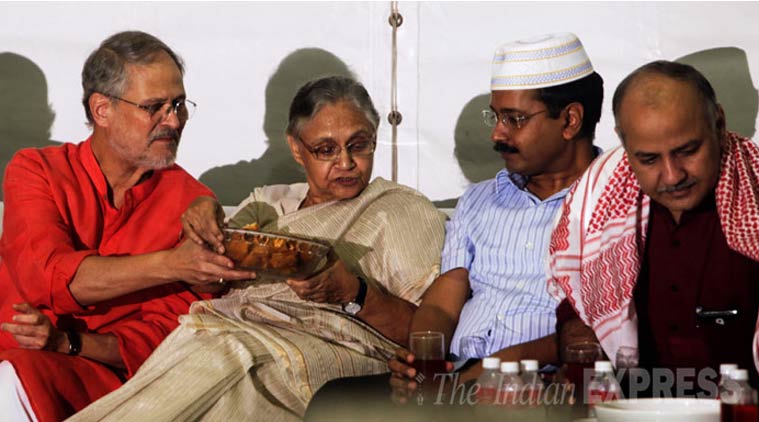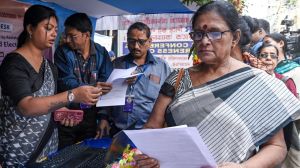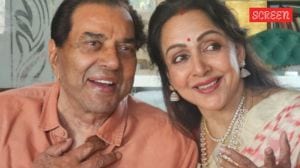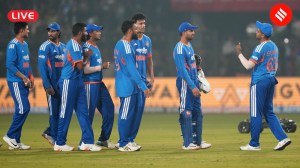Explained: Why CM Kejriwal wants the police, and why that’s not going to be easy
The Delhi Chief Minister wants PM Narendra Modi to either personally supervise Delhi Police,or to give him control over the force. APURVA explains the context and background of the demand, and what must change for it to be met
 CM Kejriwal feels it necessary to constantly battle with the central government on control over the Delhi Police — and to also be seen by the public as battling for that control.
CM Kejriwal feels it necessary to constantly battle with the central government on control over the Delhi Police — and to also be seen by the public as battling for that control.
Why is the Delhi Police not under the elected government?
The Constituent Assembly of India, while drafting the Constitution, had agreed that Delhi — as the national capital — should remain a Union Territory. Delhi was redesignated as National Capital Territory by an act of Parliament in 1993, but it is still governed as any other UT, where issues of land, law and order and police remain vested with the central government through the Lieutenant Governor.
Why is this an important issue for Arvind Kejriwal?
The Chief Minister knows what the wrath of the electorate can achieve. The December 16, 2012 gangrape played no small part in the Congress’s disastrous performance in the Assembly elections the following year. Chief Minister Sheila Dikshit attempted in vain to tell the public that law and order and police were not under the Delhi government. But, says Dikshit, “The people do not necessarily care about such technicalities. For all practical purposes the Delhi Police and I as the CM were one and the same.”
Video loading…
The AAP cannot afford a similar situation. So Chief Minister Kejriwal feels it necessary to constantly battle with the central government on control over the Delhi Police — and to also be seen by the public as battling for that control.
How have governments worked with the police since 1993?
Among the earliest resolutions the first elected government of Delhi — led by Chief Minister Madan Lal Khurana of the BJP — passed in the Assembly was a demand for full statehood. Three years later, the BJP government of Sahib Singh Verma passed a similar resolution — and, subsequently, so did Dikshit’s Congress government. There have been repeated requests, demands and threats, but the Delhi government has always managed to find a way to work in tandem with the LG, who controls the Delhi Police and, through the Delhi Development Authority, has power over land.
Can the Delhi Police come under the Delhi government?
It is possible, but only after a constitutional amendment. Former Lok Sabha and Delhi Assembly Secretary S K Sharma says Article 239 of the Constitution, which defines the administration of Union Territories, would need to be amended. “Unless this is amended, absolutely nothing can be done. And a constitutional amendment requires a two-thirds majority in the Lok Sabha and Rajya Sabha, which of course, is easier said than done,” Sharma says.
Are there alternatives to amending the Constitution?
The Delhi government under Sheila Dikshit between 1998 and 2013 had made several recommendations to the union Home Ministry about the Delhi Police. “There are options without amending the Constitution. We had recommended some changes in the appointment and powers of the police. While the police itself comes under the central government, its powers and jurisdiction can be tweaked,” a senior official said. For example, Dikshit had once recommended that all VIP security remain with the central government, while other functions like traffic be moved to the Delhi government.
“Since there will be more than one district metropolitan area, there cannot be a single commissioner for all of Delhi. This needs to be reviewed, and the term commissioner may be replaced by DGP (Director General of Police), who shall be entrusted with the task of supervision and direction of the police. The DGP shall be appointed by the Administrator (the Lt Governor) in consultation with the central government. Administrator shall consult the Chief Minister of the state,” said one recommendation sent to the Home Ministry in 2012, while discussing the Draft Police Bill.
The recommendations also included giving administrative control over forensic units to Delhi in order to “ensure independence and impartial enquiry without the fear of police commissioner”.
Are there any other options?
Some experts believe that the police in Delhi can be divided to make governance more effective. It is suggested that the central government’s influence be limited to the New Delhi district area, which encompasses most central government buildings and areas, while the rest of Delhi be administered by a police force that is under the local government.
How do things work in other countries?
Most national capitals use a similar structure, particularly for policing. In the United States, the Metropolitan Police Department of the District of Columbia, responsible for law enforcement in Washington DC, operates under the federal authority. As the capital of the United States, Washington DC is a federal district and subject to the ultimate authority of the US Congress.
- 01
- 02
- 03
- 04
- 05





































